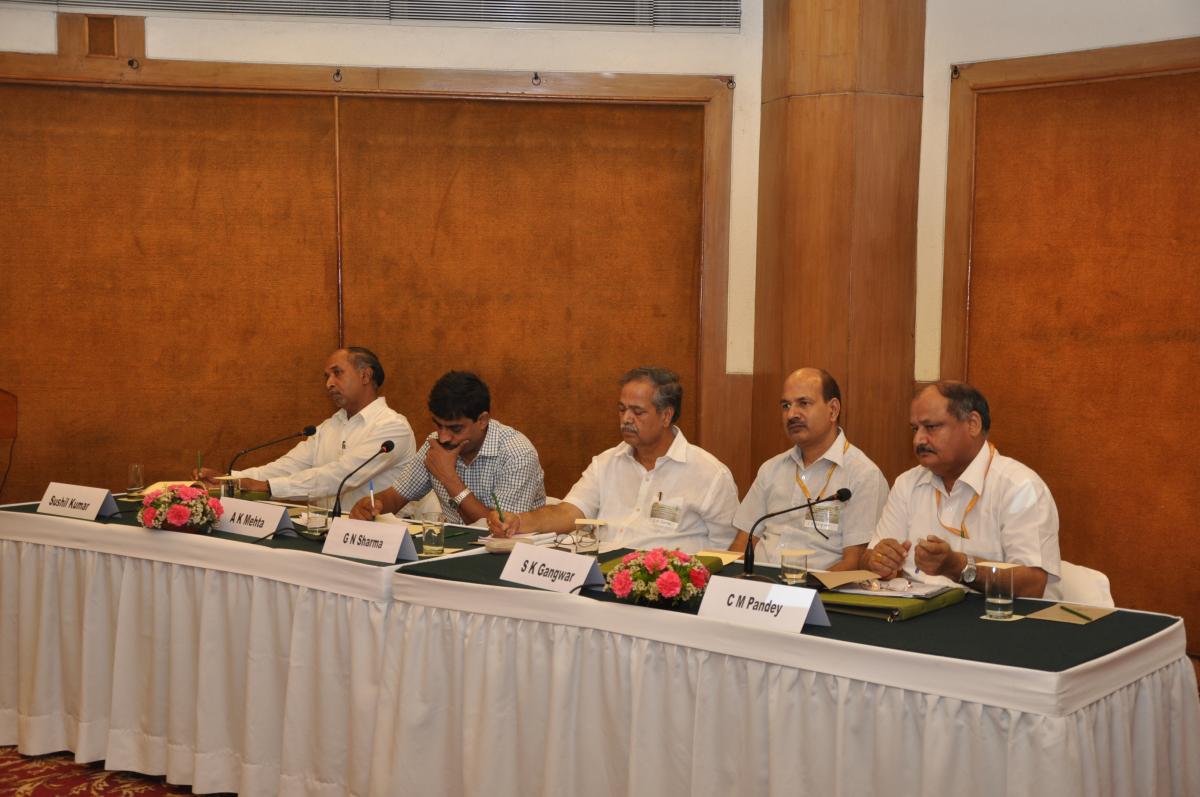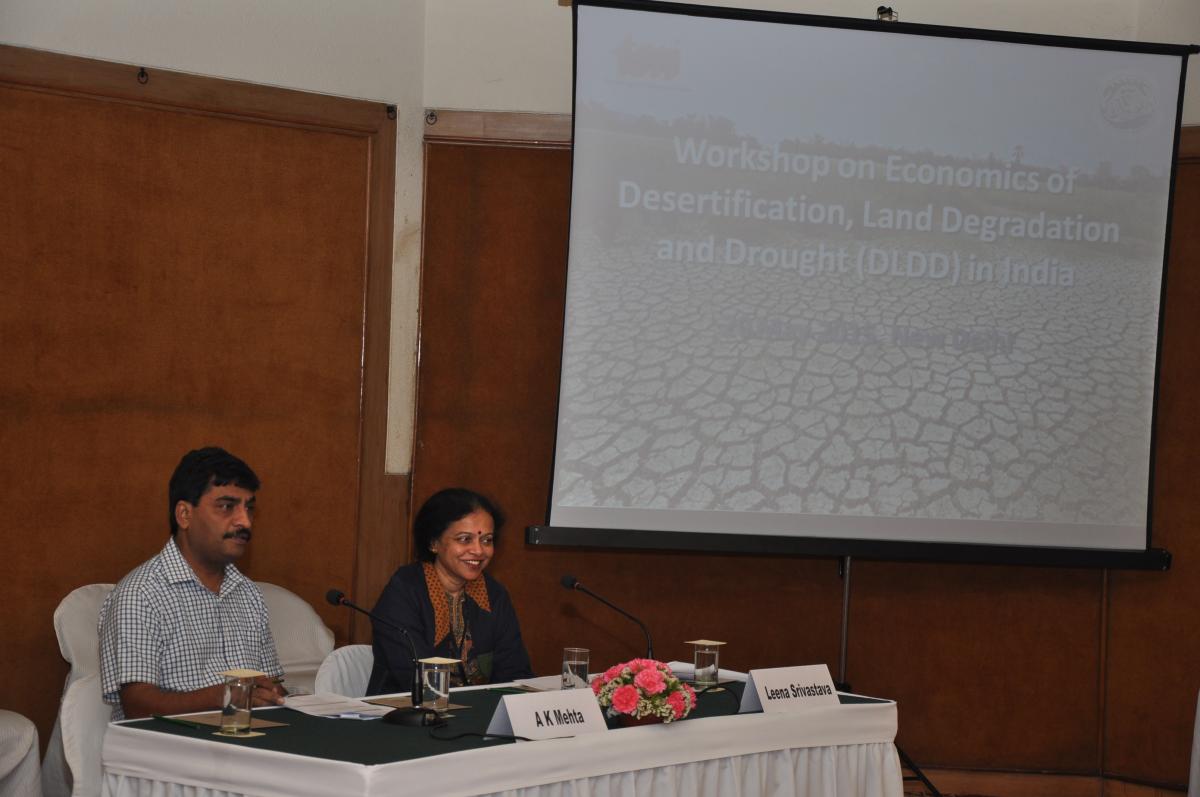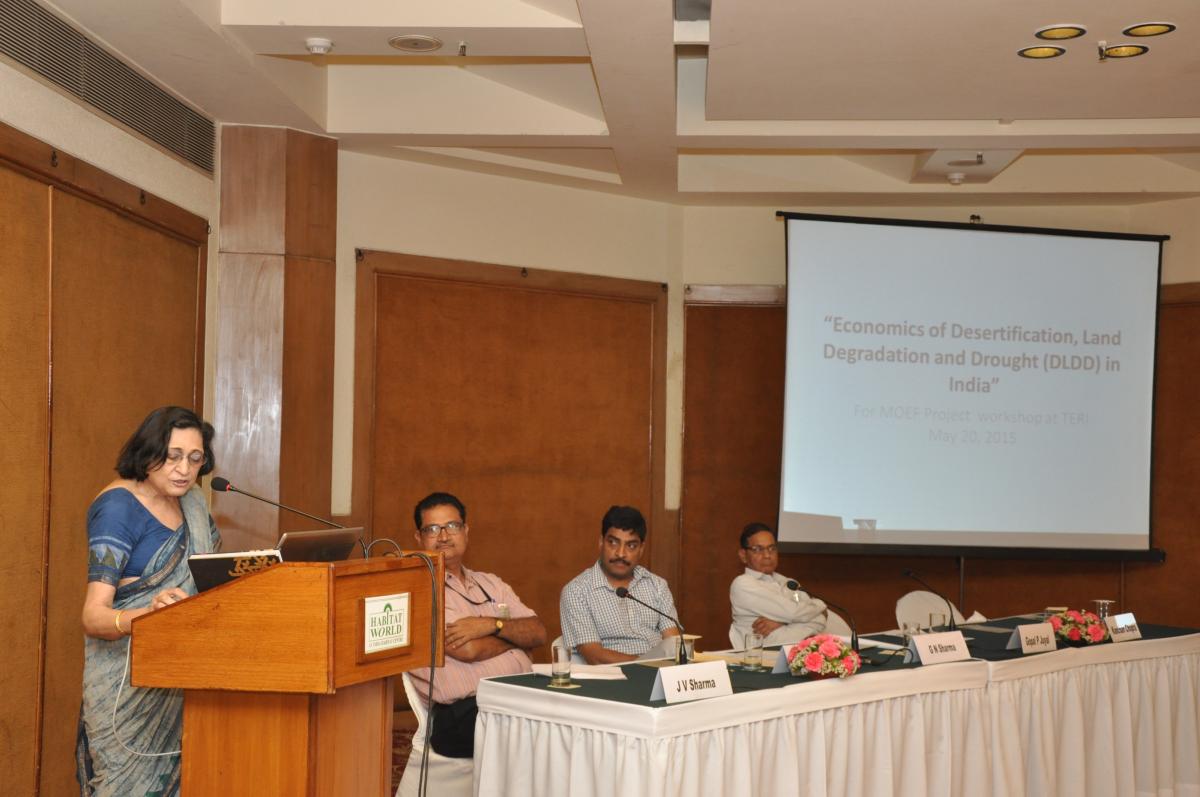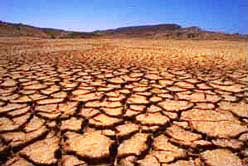Events
Events
Introduction
The issues of Desertification, Land Degradation and Drought (DLDD) are extremely relevant for our country and have significant bearing on agriculture, rural development and water resources among other key sectors. The Government of India interventions on these matters is largely through programmes managed by the different Ministries. There is widespread consensus that economic issues related to Desertification, Land Degradation and Drought (DLDD) are not adequately addressed and the lack of reliable data on the economic importance of sustainable dryland development is a major driver for the limited development investment in drylands. The lack of reliable economic data for sound and well-informed decision-making at all levels has been linked to the relatively limited scientific basis for the economic valuation of dryland ecosystems. Meanwhile, emerging environmental and socio-economic problems call for improving current land management practices based on sound scientific input.
At present, very few studies have been carried-out on the economics of desertification, or of land degradation in general, but few if any conclusions can be drawn. The absence of comprehensive studies and reliable estimates severely constrains the ability to make optimal choices balancing trade-offs between competing priorities. Also there is need for greater engagement of private sectors players by developing innovative business models that embed social and environmental benefits. The partnership with the private sector can attract crucial financial resources and also drive technological innovations that can help combat DLDD.
The Ministry of Environment, Forest and Climate Change has awarded a study to The Energy and Resources Institute on “Economics of Desertification, Land Degradation and Drought (DLDD) in India”. The study will assess the actual impacts of land degradation in the country. This will help determine how optimal allocation of financial, technical and human resources to tackle DLDD can be achieved, thereby, facilitating the planning processes at the national level and informing action at the state level.
Terms of Reference
- Examine economic valuation studies and data available from secondary literature and published sources.
- Review Government’s programmes and schemes relating to DLDD issues, targets, financial allocations and achievements.
- Select 6 case study sites for micro-economic assessment in arid, semi-arid and dry sub-humid regions of the country, identify the data requirements and sources of information
- A macroeconomic assessment for the entire Country and scenario development (till 2030)
- A micro-economic assessment for 6 case study sites for full economic assessment and scenario development (till 2030).
(The case study sites selected, based on data analysis and secondary literature, to be validated upon consultation with central and state government, concerned science and technology institutes, civil society organizations and other keys stakeholders)
Project Inception Workshop




A project inception workshop was organized on 20th May 2015 in New Delhi to deliberate on the conceptual framework and methodology for the study. The workshop was attended by officials from central and state government, scientists, researchers and representatives of various bi-lateral agencies, stimulated a lively discussion on how this enormously important, albeit complex issue should be addressed.
Agenda (145.56 KB)
(145.56 KB)
Workshop Proceedings (145.56 KB)
(145.56 KB)
Presentations
- Session I: Initiatives by the Ministries for addressing the DLDD Challenge 12
 (594.96 KB)
(594.96 KB)
- Session II: Biophysical Estimates
 (4.33 MB)
(4.33 MB)
- Session III: Economic Estimates & Valuation
 (56.60 KB)
(56.60 KB)
- Session V: Criteria Indicators for Site Selection
 (747.10 KB)
(747.10 KB)
World Day to Combat Desertification
World Day to Combat Desertification,2016
The World Day to Combat Desertification is annually observed on 17th June with an aim to strengthen the visibility of the dry lands issue and to highlight the need to curb desertification process.
The theme of WDCD 2016 celebration was “Inclusive cooperation for achieving Land degradation Neutrality” with a very emphatic and compelling slogan “Protect Earth. Restore Land. Engage People.” This slogan clearly emphasizes on the importance of comprehensive participation and cooperation of the people in working towards achieving Land Degradation Neutrality. Though land is a valuable and limited natural resource, it has been an overlooked component in sustainable development for years. It is time we change this, and therefore the clear emphasis should be on importance of inclusive cooperation to restore and rehabilitate degraded land and contribute towards achieving the overall Sustainable Development Goals.
WDCD had been celebrated for past many years by the Ministry with an active support/participation of the line ministries and other scientific organizations. This year WDCD was organized by the Ministry of Environment, Forest and Climate Change (MoEFCC) at Arid Forest Research Institute (AFRI), Jodhpur. A series of events involving schools children, farmers, members of forest and management committee, scientific communities, government officials and non-government organizations were organized on the occasion.
Read More (640.10 KB)
(640.10 KB)
World Day to Combat Desertification,2015
The World Day to Combat Desertification (WDCD) is observed worldwide every year on 17th June, since 1995. In 1994, the United Nations General Assembly declared June 17 the “World Day to Combat Desertification and Drought” (General Assembly Resolution A/RES/49/115) to promote public awareness of the issue relating to international cooperation to combat desertification and effects of drought. Since then, Parties to the Convention, organizations of the United Nations System, international and non-governmental organizations and other interested stakeholders have marked this particular day with a series of outreach activities worldwide. This is a unique occasion to remind everybody that desertification can be effectively tackled through strengthened community participation and cooperation at all levels.
The theme for this year’s celebration is “Attainment of food security for all through sustainable food systems” and the slogan for 2015 WDCD ‘No such thing as a free lunch. Invest in healthy soil advocates a multi-faceted approach for tackling hunger – from economic development, nutritional intake to managing natural disasters.
On the occasion of WDCD 2015, the Ministry of Environment, Forest and Climate Change (MoEFCC) organized a series of events involving schools children, practitioners, multi-lateral & bi-lateral agencies and private sector at the Indira Paryavaran Bhawan, New Delhi.
Read More (546.80 KB)
(546.80 KB)

